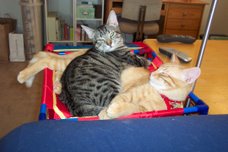Here's an interview with Brian Wansink, author of Mindless Eating and head of Cornell University's Food and Brand Lab.
It's a really good book bc the research comes from pychology and experiments. It's not necessarily "How to lose weight in a month!" but how are our lives set up that we eat more than we want to. Info I def wanted to know.
From the article:
"We believe we have all the free will in the world. We believe we overeat if the food is good or if we're really hungry. In reality, those are two of the last things that determine how much we eat," Wansink says. What really influences our eating, he says, are visibility and convenience.
To me, it's an interesting aspect of the view that we humans, esp Americans, have too much pride in what we think we are in control of. We think that we only eat what we want and that circumstances and groups don't affect us. We're stronger than that, we say. That kind of thinking leads to "If you want to stop that particular sin, just stop already" or "If you want to get out of poverty, you can do it yourself." But we're not that strong to be able to individually fight against all of our human nature and the systems set up around us. Whether with food or race or economics or temptation, there are bigger forces at work than just our mind and will. We are much weaker and smaller than we think.
I got the book from the Oakland Library and highly recommend it. Some changes to eating less and only what you want/need are: switching from short to tall drinking glasses, using smaller plates, not doing "family-style" dinner where the bowls remain on the table (instead put them in the kitchen where you have to think more if you really want seconds), not eating from the large bag but taking out a portion on a plate, and making healthy food more convenient. This is merely a short summarization - the book lists pages of sometimes funny research stories that explain why and how these things affect us.
Subscribe to:
Post Comments (Atom)

No comments:
Post a Comment